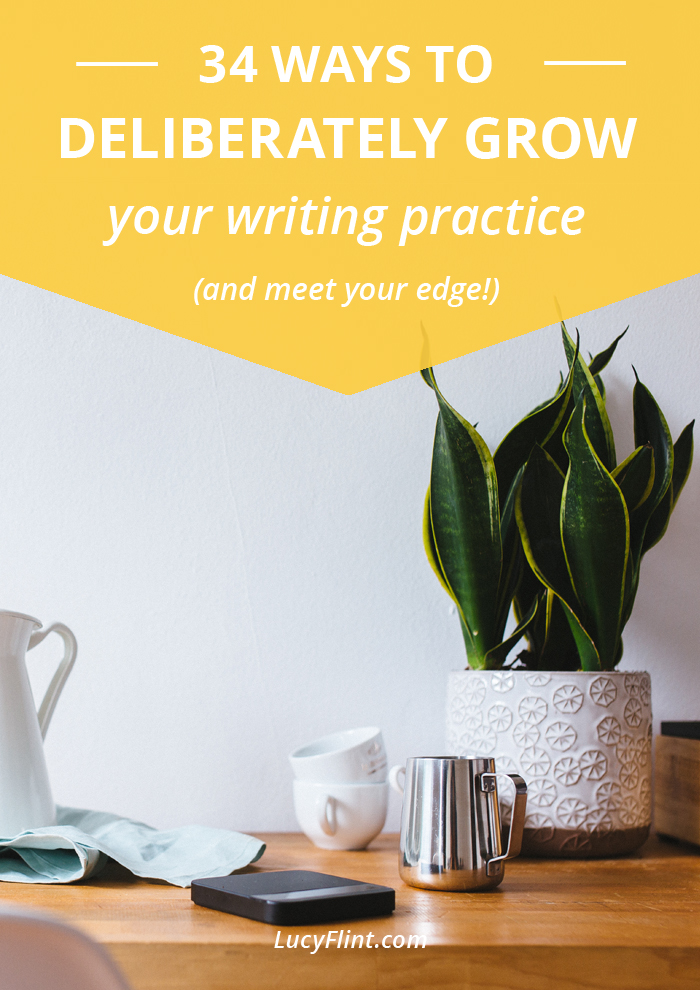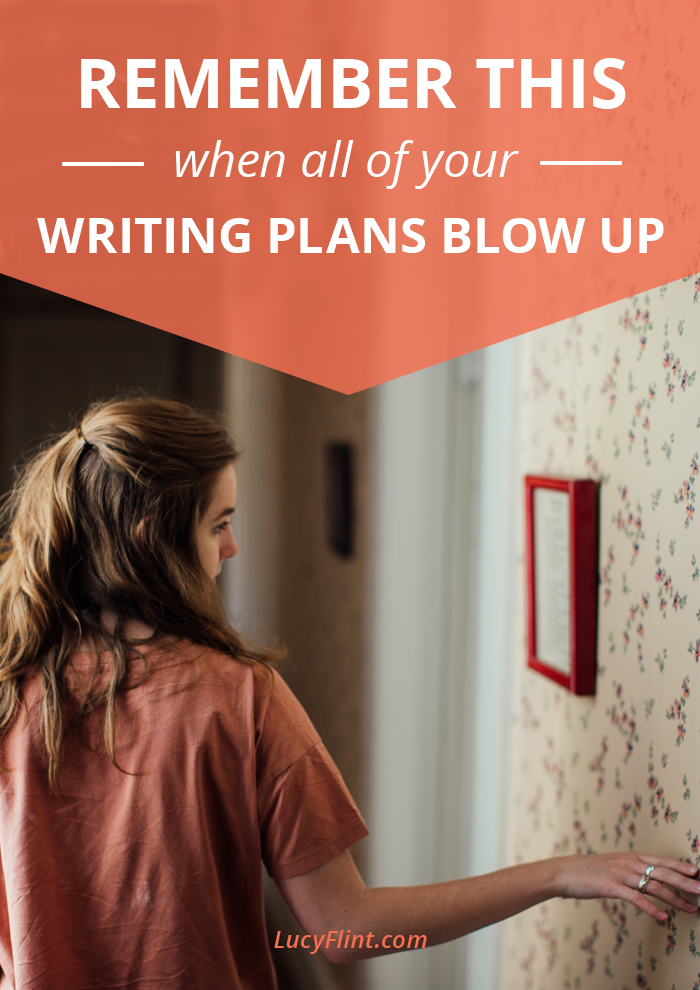34 Ways to Deliberately Grow Your Writing Practice (and Meet Your Edge!)
/Hello, my lovely lionhearts! Welcome back. We kicked off this month by getting excited about how we, as writers, get excellent at our work.
In other words, we talked about deliberate practice.
If you missed it, here's the idea in a nutshell: Deliberate practice is about leaning forward in our work. Not just going through the motions, or merely putting in the time. It's about making each minute count.
My gut response to that idea is: Sounds awesome! But then I have to ask: Will this turn me into a very stressed out, jittery, grim sort of writer? Because if so, no.
Fortunately for all of us, there's a simple way to make deliberate practice sustainable. A way to bring as much curiosity and playfulness into it as we do perseverance and intentionality.
The key to it all is this little phrase: Meet your edge.
As a process, it looks like this: Seek out the rim of what you are used to doing. Find the place where you would naturally want to give up, where you hit the limit of what's comfortable.
Then take one step out of your comfort zone—not fifty steps out, not even ten steps out, just one step outside your comfort zone—
and work there.
THAT is how growth becomes doable, sustainable, practical, and, oh yeah, super dang effective.
Excited yet? Me too.
Now, because this kind of thing doesn't work at all if it isn't practical, I've brainstormed a bunch of ways to put this to work, right this minute, wherever you're at.
Most of them are pretty small moves, designed to make one aspect of your writing game a little bit sharper. And how you use them is up to you: You might take just one and focus on it for a week (or a month!) and watch yourself steadily improve.
Or grab a handful that seem to fit you, and work with them. Or try a new one each day, for more than a month of deliberate, edge-expanding practice.
(Of course, everyone's "edge" is different, depending on where you are in the writing life. But take a look at each suggestion anyway, because getting even better at the basics is one way we can all meet our edge!)
... Oooh, do you hear that? The next level of writing excellence is calling.
Here are 34 ways to practice writing deliberately!
1. Internalizing Story Structure: After finishing a novel or a movie, take five minutes to jot down the key structural points of the narrative. (I like using the three-sentence Story Spine model that Shawn Coyne describes at the beginning of this article.)
2. Dissecting Scene Structure: While reading a novel or watching a movie, pause after an especially loaded scene and take a moment to break it apart. How exactly did it begin and end? How did the writer build it to a climax, and what did it change for the overall narrative? Sketch out the skeleton of the scene to see how it was achieved.
3. Honing Dialogue: Copy out the guts of a dialogue exchange (just the stuff in quotes, without any of the extra descriptions or tags). Read those spoken words out loud, and get a sense for how dialogue sounds—especially the rhythms and beats behind a really good exchange. (This is great to do for published works you admire, or for tightening your own work.)
4. Analyzing Wordcraft: There's something about copying out someone else's work by hand. It helps you go from merely reading it, to seeing its nuts and bolts. Grab a work you admire and copy out an especially well-constructed paragraph. Study it phrase by phrase, sentence by sentence. (But obviously, um, don't take credit for someone else's work.)
5. Sprucing Vocabulary: Shake up the words that you tend to rely on by doing a deep dive into a book of poetry, a children's reference book, or your favorite dictionary. Savor the new mix of specific nouns and verbs, and push yourself to use a few in your next writing session.
6. Surveying Novel Skills: Grab a few favorite novels and check out how each author handles something you're having difficulty with. Try comparing story openings; chapter openings; chapter endings; dialogue; descriptive passages; or action scenes. Get really clear on how each author is choosing to address that area, and how effective their choices are—why they work, why they don't. (And there's nothing like forcing yourself to write down one clear sentence describing what you've learned, to be sure that you're actually figuring it out. So scribble down specific notes as you go!)
7. Clarifying What Didn't Work: When you encounter a novel or a movie that you hate (or even just felt meh about), push yourself to pinpoint exactly what didn't work for you. Where, precisely, did they fall off track? What could they have done differently to improve the whole story? The more specific and comprehensive and relentless you are with this, the more you build your own story-rescue muscles.
8. Taking Action: I don't know if you're this way, but it's easy for me to read helpful writing books without taking any real action. Next time you find some helpful writing advice, instead of nodding and then maybe forgetting about it (though with great intentions, of course!), challenge yourself to take whatever extra step is required to put part of it immediately into practice... right away.
9. Listening for Cadence: Read your own work out loud. This is common advice for a really good reason—the ear can catch what the eyes sometimes miss when it comes to pacing, rhythm, and overall coherence.
10. Improving Description: Take an extra five minutes to sharpen a descriptive passage in your work. Challenge yourself to choose extra-clear nouns and vivid verbs. Make each sentence as specific as possible.
11. Interviewing Characters: Take the character who feels the weakest in your project, and give them five minutes of your undivided attention. Imagine them sitting with you in the room. I mean, really. Try to bend reality. Freak yourself out a little. And then jot down anything that they decide to say to you. (The more I come back to conjuring up my characters, to making them real and alive and right next to me, the more amazing my story becomes.)
12. Expanding the Brainstorm: The next time you need to brainstorm something, push yourself to come up with twice as many ideas as you think you'll need—in half the time. Try fifty ideas in five minutes. You just might astonish yourself at how creative you get in that last minute.
13. Sharpening Observation: Take a familiar object and come up with five new ways of describing it. Try using senses you don't usually apply in this case. Brew new metaphors; create an unusual significance.
14. Noticing the Details: After you've been away from your writing desk, challenge yourself to create a clear, accurate, two-sentence description of something you've just experienced: maybe the quality of light in your kitchen, a summary of the conversation you just had with friends, or the feel of the weather outside.
15. Enlivening Setting: Challenge yourself to make a list of what makes a place (real or imagined) feel unique. And try to work the senses that you tend to forget about—maybe the quality of the air, the less noticeable sounds, the textures, the smells.
16. Visualizing Specifics: Sketch a five-minute map of one of the settings that you're working on. A piece of storyscape that you haven't mapped yet: maybe a road, a section of a city, or even a room—in as much detail as if you were going to literally build a set for it.
17. Defining the Problems: When you're facing a story snag or other problem in your work, take a few minutes to very clearly articulate what's wrong. Force yourself to get specific and succinct about exactly what isn't working and why. (It's too easy to have a vague sense of unease and then rush off to fix it, without being certain about what has gone wrong. But finding clarity can be half the battle!)
18. Stimulating the Imagination: Take five minutes to think about how well-fed your imagination feels right now. What are you missing? What are you craving? Brainstorm a mini list of creative inputs that sound amazing—do you need a great nature documentary, a trip to an art museum, a visit to the best bakery in town, a travel book with tons of pictures, or a TED talk festival? Get clear on what you need, and block out time soon to do it.
19. Nurturing Curiosity: Grab a reference book at random and browse it for 5 minutes. Let your imagination get excited. (Seriously, do it. You never know where your next incredible idea is going to come from. It could be waiting for you in that reference book!)
20. Journaling Your Life: One way to keep growing as a writer is to take notes on your own life. If you don't yet have a journaling practice, try writing just one page a day—maybe first thing in the morning, or last thing before you go to bed. (If that's too much, try half a page. You can seriously handle half a page.)
21. Redirecting the Overplan: If you tend to fall down the overplanning spiral of hundreds of to-do items on dozens of lists, this is your deliberate practice! The next time you catch yourself overplanning, go ahead and finish your list. Then walk away—into another room or just outside. Take a few deep breaths and clear your mind for a sec. And then decide, from your gut, what the top three-to-five items should be. The things that honestly, truthfully, you-know-it-in-your-core matter the most. Write those down on a tiny slip of paper. And begin by working only on those things. (This works for me every. single. time.)
22. Accepting Rest: It is impossible to work well for long when you're overtired. If meeting your edge means showing up for your work well rested, then take a nap. If it means napping every day, then nap every day!
23. Revolutionizing Your Mindset: Take five minutes at the start of every writing session and practice believing in yourself. (I know. It sounds hokey, but it could literally change everything for you, especially if you've been struggling. Read the second half of this post if you need more convincing.)
24. Protecting Boundaries: Step back from one thing this week that you know will drain your energy/creativity without giving much back to you. Practice saying no. (You have my permission to get addicted to this: protect your writing time and energy, my friend!)
25. Deepening Self-Kindness: If it's easy for you to be harsh with yourself, then meeting your edge is gonna look a lot like practicing grace. Take two minutes to write yourself an encouraging note, and post it by your writing spot. Work on consciously agreeing with it when you see it. High five yourself.
26. Focusing Consistently: Do a little distraction clean-up. What tends to slice into your focus while you're working? Texts? Music? Internet? Notifications? Whatever it is, eliminate your pet distraction for a week. (And then another week. And then another...)
27. Bettering Your Work Space: What's the one thing that bugs you the most about your writing space? Is there something that's just a little out of place, that keeps slowing you down, that needs a little extra organization or cleaning or attention? Take five minutes to make it better.
28. Braving the Blank Page: Teach yourself to conquer the blank page by practicing with five-minute segments. (No kidding!) Pull out a blank sheet of paper. Commit to having no standards whatsoever for the quality of the writing you're about to do. If it comes out all wonky, that's great. Seriously. Set a timer for five minutes, and the moment you start the timer, just write. It can be about how your day went; it can be the secret history of every little knick-knack on your writing desk; or it can be about your favorite character in your current writing project. Anything. Write till the timer stops. Repeat, until blankness no longer scares you. This has actually worked for me, I promise. (When we stop being afraid of the blank page, we become literally unstoppable as writers. Think about that for a sec.)
29. Holding Space: Practice accepting the truth that the writing process is messy. It just is! Allow a bad sentence (section, chapter, subplot) to exist in a draft for now. Let yourself be okay with the roughness of a rough draft, instead of tumbling into a hyper-perfection-seeking cycle.
30. Refusing to Be Bullied: The next time you feel like comparing your work with someone else's work, or comparing where you are in your writing life with where someone else is: Stop. The next time self-doubt comes prowling and wants to sharpen its claws on you: Stop. Comparison and self-doubt do not have your back, and you don't need to listen to them. Be on your own team. Take a deep breath, and accept yourself and where you are. You are exactly where you need to be, my friend!
31. Increasing Your Writing Stamina: Start adding a little more time to your writing sessions, or working a smidge past your usual stopping point. Maybe add 50-100 more words than you normally aim for, or working 5-10 minutes longer at a stretch.
32. Knowing When to Pause: If you tend to work yourself too hard and burn your brain to a crisp (you know who you are!): one way to meet your edge is to give yourself an honest-to-goodness break in the midst of your work. Take three-to-five minutes and step away. Close your eyes, or give yourself a chance to stretch, or go outside and stare at something non-digital for a while.
33. Extending Attention: Instead of giving in to the impulse to rush (we all fight it!), try sticking with a writing project a little bit longer. Maybe spend five more minutes on a paragraph you're tempted to hurry through, or one extra week on a development stage that you're itching to skip over.
34. Releasing Finished Work: And sometimes, the thing we most need to practice doing, is letting something be done, instead of endlessly nitpicking at it. Everything on earth has a flaw in it, my friend. What is it truly time for you to release?
Deliberately Practicing Deliberate Practice
This all comes down to being on the lookout for your own edge. Where do you feel yourself shrinking and saying, Nah, no, not today, not feeling it, not now.
Where is it easier to slump right now—in your craft, in your emotional health, in how you set up your work? How can you encounter that edge of yours, and work there?
Again, this is not about leaping way past our edge, about doing things that are unwise, or working where we are honestly not ready to work.
Instead, it's about noticing where we want to dodge something that feels a little too hard, a little too real, a little too taxing. Something that's a bit uncomfortable.
And instead of skipping over it, we focus in.
Take a deep breath. Choose to smile through it. And work right there.
Where can you bring extra curiosity, attention, playfulness, and grit, into your writing work this week? If you have more ideas for ways to "meet your edge," I'd LOVE to hear them, so please post a comment!


















